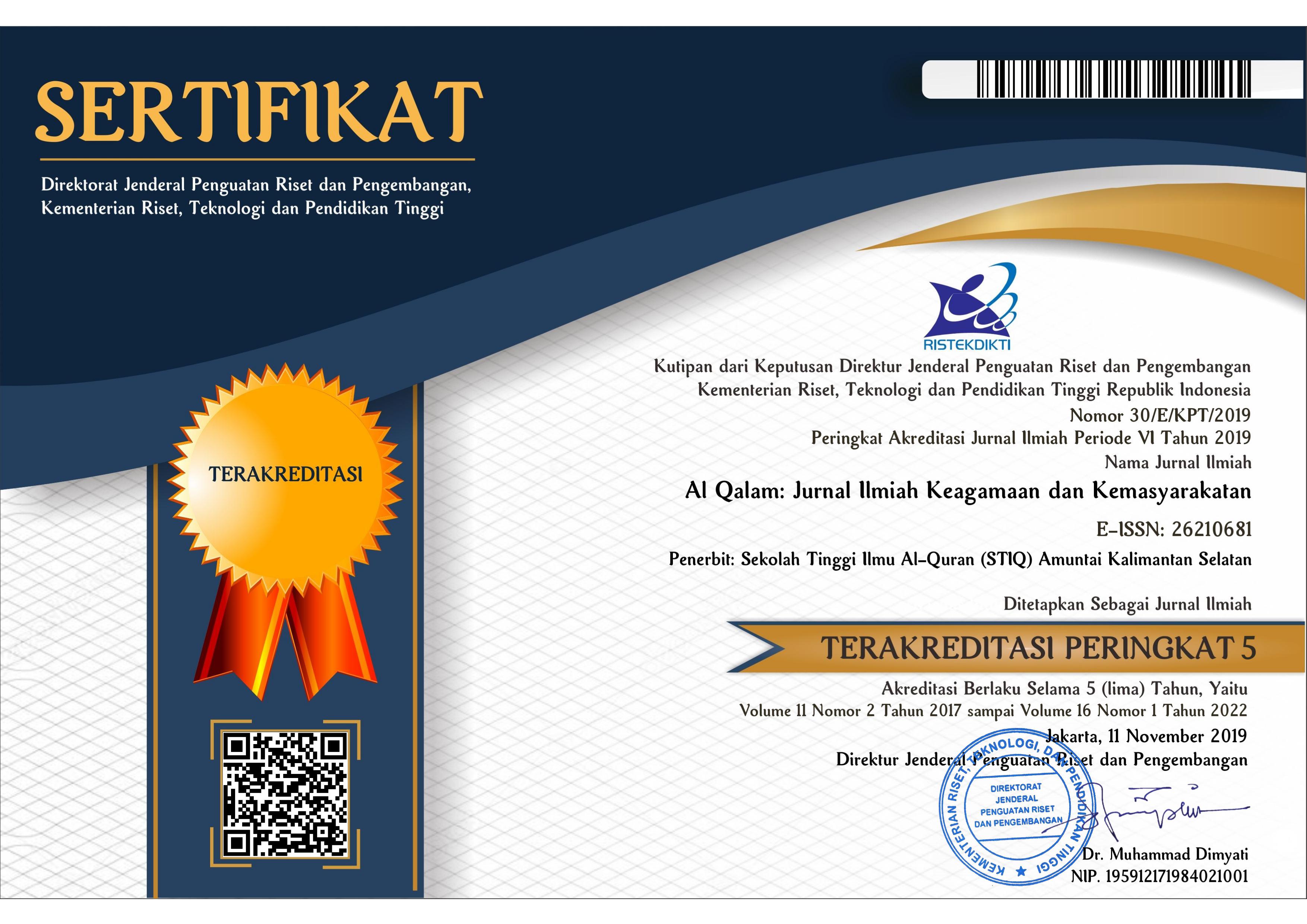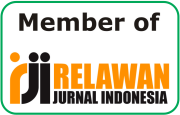Marriage Kinship in the Customary Marriage Institution in Seith Negeri, Ambon Island
Abstract
Traditions in indigenous communities on Ambon Island are found in various aspects of life. Relatively, traditions become rules or guidelines for the community to carry out their life activities in the economic, political, legal, socio-cultural, and other fields. Of course, the ancestors placed this effort to avoid irregular living behavior so that the community would feel peace and comfort. Therefore, the basis laid for generations will become a reference for acting and building a life together, such as marriage kinship in the traditional marriage process in Negeri Seith, Ambon Island. Seith, as a Muslim negeri, provides space for the mechanism of customary practices of its community, especially in the tradition of marriage. Therefore, marriage kinship receives recognition and is integrated into marriage religiously. This reality illustrates that traditional and religious institutions do not compete but together contribute to strengthening society and its people who want to build a new household. This research aims to reveal, discover, and analyze the value and meaning of marriage kinship in the traditional marriage process in Negeri Seith. The research method used is qualitative, using interview and observation data collection techniques. Indeed, this is important to show the objective reality of the community carrying out customary rules regulated by ancestors and the provisions of God Almighty through religious institutions. The marriage kinship is the marriage guardian, and the bride-to-be's father's relatives determine that religious marriage will be carried out if it is by these provisions.
Keywords
Full Text:
PDFReferences
Capistrano, Robert Charles G. “Reclaiming the Ancestral Waters of Indigenous Peoples in the Philippines: The Tagbanua Experience with Fishing Rights and Indigenous Rights.” Marine Policy 34, no. 3 (2010): 453–60. https://doi.org/10.1016/j.marpol.2009.09.012.
Charlton, Guy C., Xiang Gao, and Da Wei Kuan. “The Law Relating to Hunting and Gathering Rights in the Traditional Territories of Taiwan’s Indigenous Peoples.” Asia Pacific Law Review 25, no. 2 (2017): 125–48. https://doi.org/10.1080/10192557.2017.1403792.
Currie, D. H. “‘Here Comes the Bride’: The Making of a ‘modern Traditional’ Wedding in Western Culture.” Journal of Comparative Family Studies 24, no. 3 (1993): 403–21. https://doi.org/10.3138/jcfs.24.3.403.
Fatmawati, Endang. “Strategies to Grow a Proud Attitude towards Indonesian Cultural Diversity.” Linguistics and Culture Review 5, no. S1 (2021): 810–20. https://doi.org/10.21744/lingcure.v5ns1.1465.
Feinburg, Jessica. “Exposing the Traditional Marriage Agenda.” Northwestern Journal of Law & Social Policy 7, no. 2 (2012): 351.
Hanif, Akhyar, Tri Yuliani, Riki Rikarno, and Novi Budiman. “Sociological Studies Minangkabau Traditional Mariage.” Melayu Arts and Performance Journal 6, no. 1 (2023): 96. https://doi.org/10.26887/mapj.v6i1.3739.
Jamil, Syahril, Muhammad Adil, Muhammad Torik, Zulmi Ramdani, Muhammad Abdillah, Yen Fikri Rani, and Cholidi. “Changes in Islamic Society and Culture in Customary Marriage Within the Uluan Musi Community.” Journal of Population and Social Studies 32, no. December 2023 (2023): 107–29. https://doi.org/10.25133/JPSSV322024.007.
Marimbe, Francis. “Exploring Cultural Hybridity Branded by Convergence and Syncretism in the Characteristic Features of the Pentecostal Charismatic Churches in Zimbabwe: Implications for Spiritual and Material Well-Being.” Religions 15, no. 1 (2024): 1–23. https://doi.org/10.3390/rel15010102.
Moeti, Bakadzi, Setlhomo Koloi-Keaikitse, and Hildah L. Mokgolodi. “Married Women’s Lived Experiences on the Value of Traditional Premarital Counseling ‘Go Laya’ on Marital Stability in Botswana.” Family Journal 25, no. 3 (2017): 247–56. https://doi.org/10.1177/1066480717710951.
Muñoz, Abigail Casas, Ángel Eduardo Velasco Rojano, Aarón Rodríguez Caballero, Eva Prado Solé, and Martín G. Álvarez. “Associations between Mental Health Problems and Adverse Childhood Experiences ACEs in Indigenous and Non-Indigenous Mexican Adolescents.” Child Abuse and Neglect 147 (2024): 1–8. https://doi.org/10.1016/j.chiabu.2023.106595.
Pudjiati, Sri Redatin Retno, Sri Hartati Dewi Reksodiputro, and R. Urip Purwono. “Family Resilience Model: The Influence of Cultural Identity, Coping, Family Strain, Socioeconomic Status, and Community Support on Family Resilience among the Batak Toba Ethnic Group.” Makara Human Behavior Studies in Asia 25, no. 2 (2021): 153–69. https://doi.org/10.7454/hubs.asia.1131121.
Rahmatullah, Prayudi, Universitas Islam, Negeri Maulana, Malik Ibrahim, and Malang Indonesia. “Maantar Jujuran Tradition in Banjarnese: Increasing Social Status or Maintaining Values.” MEDIA SYARI’AH: Wahana Kajian Hukum Islam Dan Pranata Sosial 25, no. 1 (2023): 51–66. https://doi.org/10.22373/jms.v25i1.14921.
Rifai, Rifai, Nunuk Suryani, and Akhmad Arif Musadad. “Kalwedo Culture in the Traditional Marriage of the Southwest Moluccas Community.” International Journal of Multicultural and Multireligious Understanding 6, no. 1 (2019): 367–72. https://doi.org/10.18415/ijmmu.v6i1.622.
Sadiani, S. “Duit Turus: A Solution to Conflicts in Dayak Traditional Marriages.” Utopia y Praxis Latinoamericana 25, no. Extra 6 (2020): 249–56. https://doi.org/10.5281/zenodo.3987616.
Saputra, Hardika, Cholidi, Muhammad Adi, and L. “Islamic Acculturation and Local Culture (The Symbolism of the Community Life Cycle Ceremony Lampung Pepadun).” International Journal of Multicultural and Multireligious Understanding 8, no. 11 (2021): 679–85. https://doi.org/10.18415/ijmmu.v8i11.3455.
Shrinkhal, Rashwet. “‘Indigenous Sovereignty’ and Right to Self-Determination in International Law: A Critical Appraisal.” AlterNative 17, no. 1 (2021): 71–82. https://doi.org/10.1177/1177180121994681.
Singagerda, Faurani Santi. “Islamic Integralism and Muakhi Culture: The Relevance of Philosophical Values of Local Culture and Lampung Community Development.” International Journal of Disaster Recovery and Business Continuity 11, no. 3 (2020): 1880–92.
Soumena, M Yasin, Dosen Sekolah, Tinggi Agama, and Islam Negeri. “Pemberlakuan Aturan Perkawinan Adat dalam Masyarakat Islam Leihetu-Ambon (Analisis Antro-Sosiologi Hukum).” Jurnal Hukum Diktum 10, no. 1 (2012): 40–51.
Swift, Elizabeth. “Narrative Traditions of the Digital St/Age: Learning from Indigenous Cultures.” New Techno Humanities 30 (2024): 1–8. https://doi.org/10.1016/j.techum.2024.01.003.
Titaley, Elsina, and Aholiab Watloly. “The Cultural Values of the Island’S Indigenous People.” Sosiohumaniora 23, no. 3 (2021): 313. https://doi.org/10.24198/sosiohumaniora.v23i3.28235.
DOI: http://dx.doi.org/10.35931/aq.v18i4.3512
Refbacks
- There are currently no refbacks.
Copyright (c) 2024 Christwyn Ruusniel Alfons, Hermien L. Soselisa, Elsina Titaley

This work is licensed under a Creative Commons Attribution 4.0 International License.
Al Qalam: Jurnal Ilmiah Keagamaan dan Kemasyarakatan
index by:
Publish by:
Sekolah Tinggi Ilmu Al-Qur'an Amuntai
Contact us:
Address: Jl. Rakha Pakapuran, Amuntai Utara
Kabupaten : Hulu Sungai Utara
Kode Pos : 71471
Provinsi : Kalimantan Selatan
Telephone : 085251613000
Email: hafizhihusinsungkar@gmail.com

This work is licensed under a Creative Commons Attribution 4.0 International License


